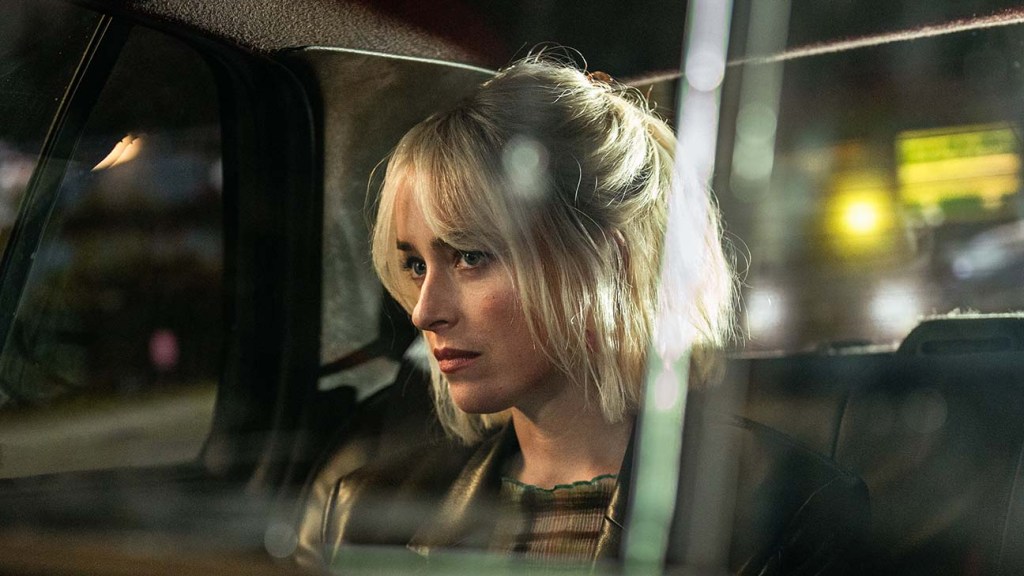
Christy Hall makes a modest but rewarding directorial debut with Daddio, a two-hander starring Sean Penn and Dakota Johnson, the latter of whom also deserves credit for lending support to the offbeat project as producer.
The movie opens with a young woman (Johnson) getting into a taxi at JFK airport. Her cab driver (Penn) seems pleased that she is not in thrall to her cell phone but actually is open to conversation. The remainder of the movie takes place in the cab as both characters let their guard down and reveal secrets that they might not disclose to many others in their lives. The concept of strangers sharing secrets is not unheard-of in drama, and Hall has said she first conceived Daddio as a play. But it works effectively on film, thanks to outstanding performances by the two actors and deft staging by the director.
Daddio
The Bottom Line
A deftly executed debut feature.
Before too long, Johnson’s character does take out her cell phone, where she is receiving raunchy messages from a man who begs her for some intimate photos. Penn quickly guesses that her phone pal is a married man, and he soon realizes that the man is considerably older than Johnson — also hinted at by the film’s title. Johnson is returning from a visit with her older half-sister in Oklahoma, and the backstory of a distant father surfaces, as do more painful revelations of an absent mother and a history of abuse by her sister.
As Penn listens with the nonjudgmental wisdom of a man who has probably heard it all during many other long cab journeys, he reveals a bit about his own loneliness and frustrations. But there is no question that Johnson’s troubled history will form the core of the story. She seems to have overcome past traumas to form a fairly successful career as a computer programmer, but the old wounds are deep, and her present entanglement with Daddy (or Daddio) has done very little to ease her pain. Viewers may think that Penn is almost playing the role of therapist, asking just the right questions to draw out her history and encouraging her to ponder some of the decisions she has made in her life.
Johnson, still probably best known for her role in the Fifty Shades trilogy, has done fine work in other movies like The Lost Daughter and Cha Cha Real Smooth. But her performance here is still something of a revelation. She commands the screen in closeup, and she radiates strength as well as a deep sense of hurt. Penn has shown versatility in the past. He has played plenty of tough guys, but he exuded humor and warmth in his Oscar-winning role in Milk. Here he channels some of that same charm and makes a perfect foil to Johnson. During the course of their conversation, Penn speaks of two failed marriages and recalls privileged moments in his first marriage. Johnson asks if he misses his wife, and he answers, “Sometimes.” The expression on Penn’s face demonstrates the eloquence that a gifted actor can summon without saying more than a single word.
Something should be added about the physical challenges of filming almost an entire movie in a taxicab. According to Hall, most of the movie was actually shot in a studio with a taxi built on the stage. The fact that it seems so authentic is a tribute not only to the director but to veteran cinematographer Phedon Papamichael (Nebraska, The Trial of the Chicago 7) and production designer Kristi Zea (The Departed, The Silence of the Lambs). There are just a few exterior shots in the film, and one shows the aftermath of a horrific accident that caused a major delay on the protagonists’ journey. This scene is not irrelevant; it conveys the fragility of life and the importance of meaningful connection in an often dangerous world.
The two main characters here have definitely made that connection by the time Johnson reaches her destination in Manhattan. The conclusion leaves their futures very much an open question, but the two superb performances and the tactful hand of a gifted new director ensures that the audience will still be thinking about these people long after the journey ends.













